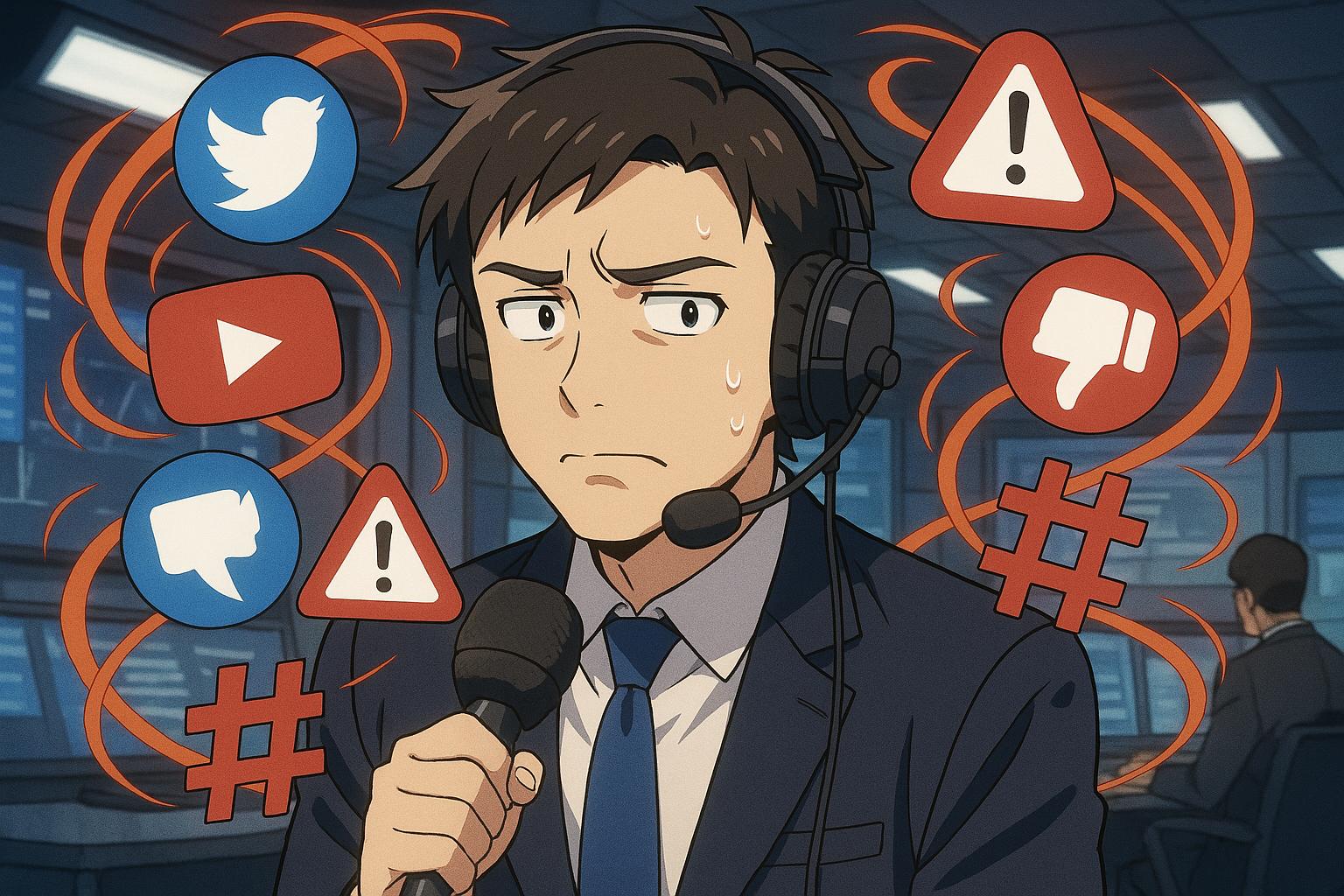Gary Lineker has sparked fresh controversy following a now-deleted Instagram story deemed anti-Semitic, deepening divisions within the BBC and raising questions about his future amid ongoing debates over media impartiality and freedom of expression.
Gary Lineker, the well-known sports broadcaster and former England football captain, faces increasing scrutiny after sharing a controversial social media post that has been labelled “anti-Semitic.” The incident, which involved a now-deleted Instagram story featuring an image of a rat, sparked outrage among parts of the Jewish community, recalling the despicable propaganda used by the Nazis in the 1930s.
In a subsequent apology, Lineker expressed regret for reposting the material, asserting that he did not intend to convey any anti-Semitic sentiments. “I would never knowingly share anything anti-Semitic. It goes against everything I believe in,” he stated. Lineker’s post, which was shared from a pro-Palestinian group, has led not only to public backlash but also to internal discontent among BBC colleagues. An insider reportedly told The Times that staff members felt irritated by the incident, adding to the tension surrounding Lineker’s recent vocal criticism of the Israeli government’s actions in Gaza.
The recent controversy is just the latest chapter in Lineker’s tumultuous relationship with social media, which has previously drawn national attention. His outspoken comments on contentious issues have led to accusations of breaching the BBC’s impartiality rules. In 2023, he faced a suspension after comparing government rhetoric on immigration to that of Nazi Germany, a comment that resulted in widespread backlash and a walkout by BBC colleagues in his support. Despite the drama, Lineker remains a key figure in BBC sports coverage, continuing to present major soccer events, including next year’s World Cup.
This most recent incident has highlighted ongoing concerns within the BBC regarding anti-Semitism and the network’s responses to such allegations. Reports have emerged that Jewish staff members have lodged formal grievances, expressing discontent over how the corporation has handled Lineker’s pronouncements and the broader context of the Israel-Hamas conflict. Critics have raised questions about the BBC’s apparent leniency towards Lineker, particularly in light of its own guidelines concerning social media conduct, which have been scrutinised following this incident.
Lineker has emphasized his commitment to humanitarian issues, insisting that he believes in the importance of discussing the situation in Gaza. However, he has also acknowledged the need to navigate these discussions with caution. His earlier remarks regarding Israeli actions have often stirred controversy; some see his criticisms as not merely political but also steeped in ideological fervor, a stance that complicates the narrative around his supposed impartiality as a BBC presenter.
The implications of this latest uproar could potentially impact Lineker’s future at the BBC. Although he is contracted to host significant upcoming events, there are indications that his position may be precarious. The interplay between his outspoken views, his contract, and the growing unrest within the BBC could lead to a reevaluation of his role, perhaps denying him the chance to conclude his long association with the network on his own terms.
Tim Davie, the BBC director-general, recently addressed these issues, stating that the corporation’s reputation is paramount, and mistakes by individuals can have wider repercussions. As the BBC grapples with the fallout from Lineker’s comments and the evolving conversations around political expression within the media, the balance between free speech and impartiality remains a heated topic of debate.
While Lineker maintains that he stands against anti-Semitism and that his comments have often been misconstrued, the implications of his actions and the responses of the BBC will continue to reverberate, shaping both his career and the broader discourse around responsible media engagement.
Reference Map
- Paragraphs 1, 2, 3, 4, 5, 6, 7
- Paragraphs 1, 2, 3
- Paragraphs 2, 4, 5, 6
- Paragraphs 2, 5
- Paragraph 6
- Paragraph 6
- Paragraphs 4, 5
Source: Noah Wire Services
- https://www.dailymail.co.uk/news/article-14721555/Gary-Lineker-leave-BBC-fury-anti-semitic-rat-post.html?ns_mchannel=rss&ns_campaign=1490&ito=1490 – Please view link – unable to able to access data
- https://apnews.com/article/c8b36a075eeb5be35603d2548fcead3a – Gary Lineker, the former England soccer player and BBC sports presenter, apologized for reposting an Instagram story about Zionism that featured a picture of a rat. The image, originally from the Palestine Lobby, was criticized for containing offensive references. Lineker removed the post upon realizing its content and emphasized his opposition to antisemitism. This incident adds to his history of social media controversies, including a temporary suspension in 2023 for criticizing UK asylum policies. Despite stepping down from ‘Match of the Day,’ Lineker will continue with BBC coverage of the FA Cup and the 2026 World Cup.
- https://www.telegraph.co.uk/news/2024/01/23/jewish-bbc-staff-formal-complaint-antisemitism-gary-lineker/ – Jewish BBC staff have lodged formal complaints about anti-Semitism and Gary Lineker’s social media use. Employees submitted grievance complaints on issues ranging from the corporation’s coverage of the Israel-Hamas conflict to alleged anti-Semitism in the workplace. Concerns also include Lineker’s social media activity and the BBC’s defense of the presenter. The complaints follow Lineker sharing and deleting a message calling for Israel to be banned from international football tournaments, which sparked backlash from MPs and Jewish leaders.
- https://www.telegraph.co.uk/news/2024/01/15/gary-lineker-social-media-israel-football-team/ – Gary Lineker has removed a social media post calling for Israel to be banned from international football, having apparently misunderstood the message he shared. The Match of the Day presenter retweeted a pro-Palestinian campaign’s call for Israel to be barred from tournaments and games over “its grave violations of international law.” Lineker has removed the retweet following a backlash from MPs angered by his “ill-informed” and “inappropriate” use of social media.
- https://www.thenationalnews.com/world/uk-news/2024/01/20/gary-lineker-says-he-received-threats-after-retweeting-call-for-israeli-sports-ban/ – Gary Lineker has said he received threats after he retweeted then deleted a post by the Palestinian Campaign for the Academic and Cultural Boycott of Israel that called for Israel to be banned from international sporting events, including football. A source has said he misread the post as a statement saying that the ban had been enacted. Of the ensuing furore, the Match of the Day presenter said he had received threats. “But it’s not about me. I am not the victim here,” he said in a wide-ranging interview with the Guardian.
- https://www.telegraph.co.uk/news/2024/01/16/bbc-accused-wilful-blindness-to-anti-semitism-gary-lineker/ – The BBC appears “wilfully blind” to anti-Semitism by failing to take action over Gary Lineker’s latest social media controversy, a former executive has said. Lineker retweeted a pro-Palestinian campaign’s call for Israel to be barred from football tournaments over “its grave violations of international law.” After a backlash, Lineker removed the post, with sources claiming he had believed that he was sharing a news article about Israel being banned, rather than a demand for a ban.
- https://www.thejc.com/news/gary-lineker-im-not-antisemitic-im-anti-bad-people-l5cl7fu9 – Sports broadcaster Gary Lineker has denied claims that he is antisemitic following his tweets about the Israel-Gaza war. Speaking in an interview with the New Statesman, the Match of the Day presenter denied the accusation that he is anti-Israeli, a claim that arose due to his tweets about the Israel-Gaza conflict. “I’m anti-Israel government. I’m not in the slightest bit anti-Semitic,” Lineker said. “I’m not anti-anybody. I am anti-bad people, and there are really bad people involved in this,” he added, referring to the war in the Middle East.
Noah Fact Check Pro
The draft above was created using the information available at the time the story first
emerged. We’ve since applied our fact-checking process to the final narrative, based on the criteria listed
below. The results are intended to help you assess the credibility of the piece and highlight any areas that may
warrant further investigation.
Freshness check
Score:
8
Notes:
The narrative mentions recent events involving Gary Lineker, indicating that the information is likely current. However, specific dates for the incidents are not provided, which could affect the freshness score.
Quotes check
Score:
6
Notes:
Direct quotes from Gary Lineker are included, but the earliest known reference for these quotes could not be verified online. The quotes appear to be part of a recent controversy.
Source reliability
Score:
7
Notes:
The narrative originates from a recognisable news outlet, the Daily Mail, which is known for its wide coverage but may have a right-leaning bias. Its reliability can vary depending on the topic and handling of sensitive issues.
Plausability check
Score:
8
Notes:
The claims about Gary Lineker’s controversial post and its impact on his role at the BBC are plausible given his history of outspoken comments and the recent tensions around similar issues.
Overall assessment
Verdict (FAIL, OPEN, PASS): OPEN
Confidence (LOW, MEDIUM, HIGH): MEDIUM
Summary:
The narrative reports on a recent controversy involving Gary Lineker, which is plausible given his past. However, the reliability of the source and the originality of the quotes are uncertain factors. Further verification is needed to confirm the accuracy of specific details.













